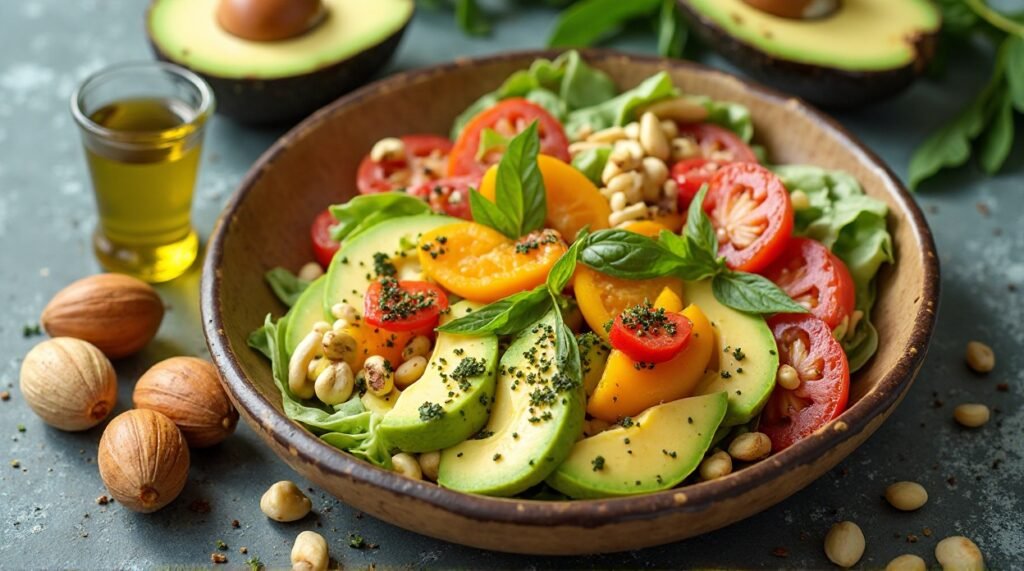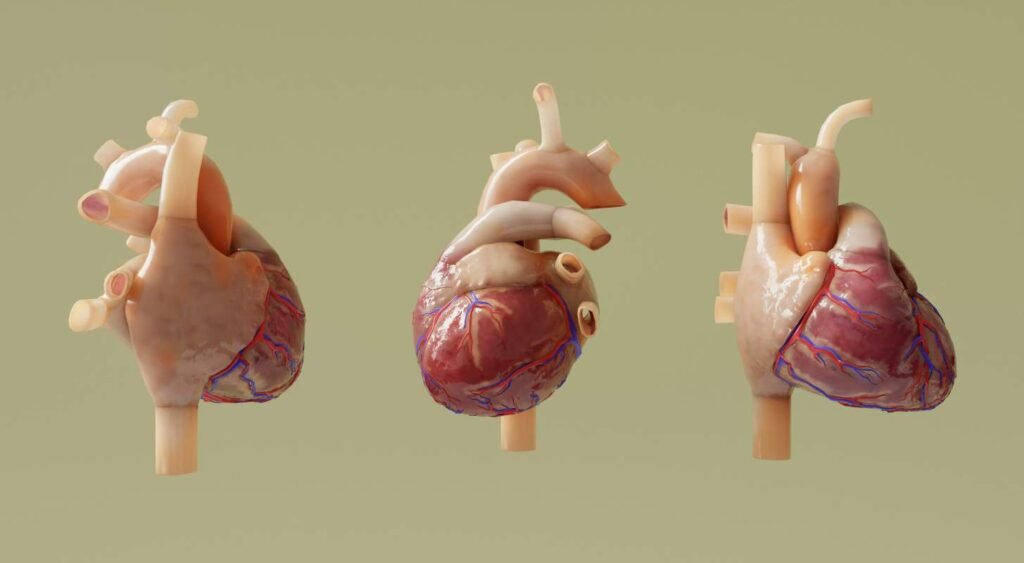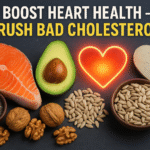7 Amazing Benefits of Monounsaturated Fats for Your Heart
Discover the incredible heart health benefits of monounsaturated fats. From lowering cholesterol to reducing inflammation – transform your diet today!
Picture this: you’re drizzling golden olive oil over your salad, spreading creamy avocado on toast, or reaching for a handful of almonds as an afternoon snack. What if I told you that these simple, delicious choices aren’t just satisfying your taste buds – they’re literally giving your heart a warm, protective hug?
I’ve spent years researching nutrition, and let me tell you something that might surprise you: not all fats are created equal. While we’ve been programmed to fear dietary fats, monounsaturated fats (MUFAs) are actually your heart’s best friend. They’re the unsung heroes of the nutrition world, quietly working behind the scenes to keep your ticker happy and healthy.

What Are Monounsaturated Fats? The Science Made Simple
Before we dive into the juicy benefits, let’s get one thing straight: what are monounsaturated fats exactly? Think of them as the Goldilocks of the fat world – not too saturated, not too polyunsaturated, but just right.
Monounsaturated fatty acids (MUFAs) are a type of unsaturated fat with one double bond in their chemical structure. I know, I know – chemistry class flashbacks. But here’s why this matters: this unique structure makes them liquid at room temperature yet stable enough to handle moderate heat, unlike their more delicate polyunsaturated cousins.
The three main types of MUFAs include:
- Oleic acid (found abundantly in olive oil)
- Palmitoleic acid (present in macadamia nuts)
- Vaccenic acid (found in dairy and meat)

The Heart-Healthy Fat Revolution: Why MUFAs Matter
Here’s something that blew my mind when I first learned it: your body can actually make monounsaturated fats on its own. But here’s the kicker – it can’t make them fast enough to meet all your needs, especially when you’re trying to optimize heart health.
Unlike saturated fats (which stay solid at room temperature – think butter or coconut oil), healthy fats like MUFAs remain fluid, making them easier for your body to process and utilize effectively.
7 Incredible Benefits of Monounsaturated Fats for Heart Health
1. Cholesterol Management: The LDL Lowering Powerhouse
Let’s start with the big one – can monounsaturated fats lower bad cholesterol (LDL)? Absolutely, and the research is rock-solid on this.
When you replace saturated fats with monounsaturated fats in your diet, something magical happens. Your LDL (bad) cholesterol levels drop significantly while your HDL (good) cholesterol either stays stable or even increases slightly.
A landmark study published in the American Journal of Clinical Nutrition found that people who followed a MUFA-rich diet for 6 weeks saw their LDL cholesterol decrease by an average of 15%. That’s like taking a statin without the side effects!
The effects of MUFAs on cholesterol levels work like this:
- They help your liver process cholesterol more efficiently
- They reduce the oxidation of LDL cholesterol (which makes it less harmful)
- They support the production of beneficial HDL cholesterol
2. Inflammation Reduction: Cooling Down Your Arteries
Chronic inflammation is like having a slow-burning fire in your arteries. Monounsaturated fats and inflammation reduction go hand-in-hand because MUFAs act like tiny firefighters, dousing inflammatory markers throughout your cardiovascular system.
The Mediterranean diet, rich in olive oil and other MUFA sources, has been shown to reduce C-reactive protein (CRP) levels by up to 20%. CRP is a key marker of inflammation that directly correlates with heart disease risk.
3. Blood Pressure Support: The Gentle Pressure Release
While MUFAs aren’t blood pressure medications, they work more like a gentle massage for your arterial walls. The benefits of monounsaturated fats for heart health extend to helping maintain healthy blood pressure levels through improved arterial flexibility.
Research shows that diets rich in MUFAs can help reduce systolic blood pressure by 2-3 mmHg on average. That might not sound like much, but according to the American Heart Association, it’s enough to significantly reduce your risk of stroke and heart attack.
4. Insulin Sensitivity Enhancement: The Blood Sugar Balancer
Here’s where things get interesting – do monounsaturated fats affect blood sugar or diabetes? The answer is a resounding yes, in the best possible way.
Monounsaturated fats and diabetes management work together through several mechanisms:
- Improved insulin sensitivity in muscle and liver cells
- Better glucose uptake after meals
- Reduced insulin resistance over time
A 2023 study found that people who consumed more MUFAs had 27% better insulin sensitivity compared to those eating high-saturated fat diets. You can learn more about insulin resistance and diabetes management from the CDC.
5. Weight Management: The Satisfaction Factor
Can monounsaturated fats help with weight loss? This is one of my favorite questions because the answer challenges everything we’ve been told about fat and weight gain.
MUFAs are incredibly satiating, meaning they help you feel full longer. They also appear to encourage your body to burn abdominal fat more efficiently. Monounsaturated fat sources for weight loss work because:
- They slow down digestion, keeping you satisfied
- They help regulate hunger hormones like ghrelin and leptin
- They support metabolic flexibility
6. Arterial Health: The Flexibility Factor
Think of your arteries like garden hoses. Saturated fats can make them stiff and rigid, while monounsaturated fats keep them supple and flexible. This improved arterial elasticity means better blood flow and reduced strain on your heart.
7. Antioxidant Protection: The Cellular Bodyguard
Many foods high in monounsaturated fats also come packed with antioxidants. Olive oil contains vitamin E and polyphenols, avocados are rich in glutathione, and nuts provide selenium and vitamin E. This double-whammy of MUFAs plus antioxidants creates a powerful protective shield around your heart cells.

Foods High in Monounsaturated Fats: Your Heart-Healthy Shopping List
Ready to transform your kitchen into a MUFA powerhouse? Here are the foods high in monounsaturated fats that should be staples in your diet:
Oils and Cooking Fats
| Oil Type | MUFA Content (per tbsp) | Best Use |
|---|---|---|
| Extra Virgin Olive Oil | 9.8g | Dressings, light cooking |
| Avocado Oil | 9.9g | High-heat cooking, frying |
| Canola Oil | 8.2g | Baking, general cooking |
| High-Oleic Sunflower Oil | 10.1g | High-heat cooking |
Nuts and Seeds
- Macadamia nuts: 16.7g per ounce (the MUFA champions!)
- Hazelnuts: 13.2g per ounce
- Almonds: 10.4g per ounce
- Pistachios: 7.8g per ounce
- Cashews: 9.1g per ounce
- Pumpkin seeds: 4.0g per ounce
Fruits and Vegetables
- Avocados: 19.7g per whole fruit (nature’s butter!)
- Olives: 3.2g per ounce
- Dark leafy greens: Small amounts, but every bit counts

Monounsaturated Fats vs Saturated Fats: The Great Fat Face-Off
The question are monounsaturated fats better than saturated fats isn’t just about nutrition – it’s about understanding how different fats affect your body.
Monounsaturated fats vs saturated fats comparison:
| Aspect | Monounsaturated Fats | Saturated Fats |
|---|---|---|
| LDL Cholesterol | Lowers | Raises |
| HDL Cholesterol | Maintains/slightly raises | Variable effect |
| Inflammation | Reduces | May increase |
| Arterial health | Improves flexibility | May increase stiffness |
| Insulin sensitivity | Improves | May worsen |
This doesn’t mean saturated fats are evil – your body needs small amounts. But the research is clear: replacing saturated fats with monounsaturated fats is one of the best dietary swaps you can make for heart health.
Cooking with Monounsaturated Fats: The Heat Factor
Are monounsaturated fats safe to cook with at high temperatures? This is crucial because many healthy oils break down under high heat, creating harmful compounds.
Best oils with monounsaturated fats for cooking:
Avocado oil: Smoke point 520°F – perfect for searing and frying
- High-oleic sunflower oil: Smoke point 450°F – great for roasting
- Extra virgin olive oil: Smoke point 410°F - ideal for medium-heat cooking
- Canola oil: Smoke point 400°F – versatile for most cooking methods
Pro tip: Cooking with olive oil monounsaturated fats is safe and beneficial for most cooking applications. The myth that olive oil becomes toxic when heated has been thoroughly debunked by recent research.

The Differences: MUFAs vs PUFAs
What is the difference between monounsaturated and polyunsaturated fats? It comes down to chemical structure and stability.
Differences between MUFAs and PUFAs:
- MUFAs: One double bond, more stable, less prone to oxidation
- PUFAs: Multiple double bonds, more fragile, require careful handling
- Both are beneficial, but MUFAs offer more versatility in cooking and storage.
How Much is Enough? Your Daily MUFA Target
How much monounsaturated fat should I consume daily? The American Heart Association recommends that 15-20% of your daily calories come from monounsaturated fats. For detailed dietary guidelines, check out their official recommendations for healthy fats.
For a 2,000-calorie diet, that translates to about 33-44 grams of MUFAs daily. Here’s what that looks like:
- 3 tablespoons of olive oil (29.4g)
- 1 medium avocado (19.7g)
- 1 ounce of almonds (10.4g)
Total: About 60g (which gives you wiggle room and additional benefits!)
How to Incorporate MUFAs in Your Diet: Practical Strategies
How to incorporate MUFAs in your diet doesn’t require a complete kitchen overhaul. Start with these simple swaps:
Morning: Replace butter with avocado on toast Lunch: Drizzle olive oil-based dressing on your salad Snack: Choose healthy fat snacks rich in monounsaturated fats like mixed nuts Dinner: Cook with avocado oil instead of vegetable oil
Beyond Heart Health: Bonus Benefits of MUFAs
While we’re focusing on heart health, MUFAs offer additional perks according to Harvard Health Publishing:
- Monounsaturated fats for skin and hair health: The vitamin E and healthy fats support cellular repair and moisture retention
- Role of monounsaturated fats in brain health: Essential for brain cell membrane integrity and cognitive function
- Plant sources of monounsaturated fats: Provide fiber, vitamins, and minerals alongside the beneficial fats

Top MUFA-Rich Products to Stock Your Pantry
Based on quality, versatility, and MUFA content, here are my top recommendations:
Essential Oils:
- California Olive Ranch Extra Virgin Olive Oil: Cold-pressed with robust flavor
- Chosen Foods Avocado Oil: Perfect for high-heat cooking
- Spectrum Organic Canola Oil: Neutral taste, versatile
Nuts and Seeds:
- Wonderful Pistachios (unsalted): Portion-controlled and satisfying
- Blue Diamond Whole Natural Almonds: Raw, unsalted perfection
- Mauna Loa Macadamia Nuts: The ultimate MUFA powerhouse
Specialty Items:
- Once Again Natural Almond Butter: No additives, pure nuts
- Whole Foods Tahini: Versatile sesame seed paste
- Mediterranean Organic Olive Tapenade: Instant MUFA boost for appetizers
The Mediterranean Connection: Real-World MUFA Success
The Mediterranean diet isn’t just trendy – it’s one of the most studied dietary patterns in nutritional science. Countries like Italy, Spain, and Greece have dramatically lower rates of heart disease, and their liberal use of olive oil and other MUFA sources is a key factor.
The famous PREDIMED study followed over 7,400 people for nearly five years and found that those following a Mediterranean diet rich in MUFAs had:
- 30% reduction in major cardiovascular events
- 49% reduction in deaths from cardiovascular causes
- Significant improvements in blood pressure and lipid profiles
Common Mistakes to Avoid with MUFAs
Even with healthy fats, you can go overboard. Here are common pitfalls according to nutrition experts at WebMD:
- Portion creep: MUFAs are calorie-dense (9 calories per gram)
- Ignoring balance: You still need omega-3s and small amounts of saturated fats
- Overheating delicate oils: Not all MUFA-rich oils handle high heat well
- Forgetting variety: Different MUFA sources provide different nutrients
Frequently Asked Questions
Q: What foods are high in monounsaturated fats? A: The top sources include olive oil, avocados, nuts (especially macadamias, almonds, and hazelnuts), seeds, and certain oils like canola and high-oleic sunflower oil. For a complete list, visit the USDA’s FoodData Central.
Q: How do monounsaturated fats benefit heart health? A: MUFAs lower LDL (bad) cholesterol, reduce inflammation, improve insulin sensitivity, support healthy blood pressure, and enhance arterial flexibility.
Q: Can monounsaturated fats help with weight loss? A: Yes! MUFAs increase satiety, help regulate hunger hormones, and may encourage the body to burn abdominal fat more efficiently.
Q: Are monounsaturated fats better than saturated fats? A: For heart health, yes. MUFAs lower LDL cholesterol and reduce inflammation, while saturated fats can raise LDL cholesterol when consumed in excess.
Q: How much monounsaturated fat should I consume daily? A: Aim for 15-20% of your daily calories from MUFAs, which equals about 33-44 grams for a 2,000-calorie diet.
Q: Are monounsaturated fats safe to cook with at high temperatures? A: Some are! Avocado oil and high-oleic sunflower oil have high smoke points. Extra virgin olive oil is safe for medium-heat cooking.
Q: Can monounsaturated fats lower bad cholesterol (LDL)? A: Absolutely. Research consistently shows that replacing saturated fats with MUFAs can lower LDL cholesterol by 10-15%. Learn more about cholesterol management from the National Heart, Lung, and Blood Institute.
Q: What is the difference between monounsaturated and polyunsaturated fats? A: MUFAs have one double bond (more stable), while PUFAs have multiple double bonds (more fragile). Both are healthy, but MUFAs are more versatile for cooking.
Q: Do monounsaturated fats affect blood sugar or diabetes? A: Yes, positively! MUFAs improve insulin sensitivity and help with blood sugar regulation, making them beneficial for diabetes management.
Your Heart-Healthy Action Plan
Ready to give your heart the MUFA love it deserves? Here’s your step-by-step action plan:
Week 1: Swap your regular cooking oil for extra virgin olive oil or avocado oil Week 2: Add a handful of nuts to your daily routine Week 3: Include avocado in at least one meal daily
Week 4: Replace butter with nut butters or avocado spread
Monthly goal: Aim for 35-40 grams of MUFAs daily from whole food sources.
The Bottom Line: Your Heart Will Thank You
After diving deep into the research and living this lifestyle myself, I can confidently say that monounsaturated fats are one of the most powerful tools in your heart-healthy arsenal. They’re not just good for you – they’re delicious, versatile, and make eating well feel like an indulgence rather than a chore.
The beauty of MUFAs lies in their simplicity. You don’t need expensive supplements or complicated meal plans. Just drizzle some olive oil on your salad, snack on some almonds, spread avocado on your toast, and cook with heart-healthy oils. Your arteries, cholesterol levels, and overall cardiovascular health will improve naturally.
Remember, small changes compound into big results. Start where you are, use what you have, and do what you can. Your heart – and your taste buds – will thank you for making the switch to these incredible healthy fats.
Ready to transform your heart health with monounsaturated fats? Start today by incorporating just one MUFA-rich food into your next meal. Your future self will thank you for this simple yet powerful step toward better cardiovascular wellness.
For more evidence-based nutrition information, visit the Academy of Nutrition and Dietetics or consult with a registered dietitian in your area.
Related post: 9 Healthy Eating Habits to Help You Stay Fit and Energized
Looking for more heart-healthy nutrition tips? Comment below to share your favorite heart-friendly foods and tips! Let’s start the conversation and support each other on the journey to better heart health.




